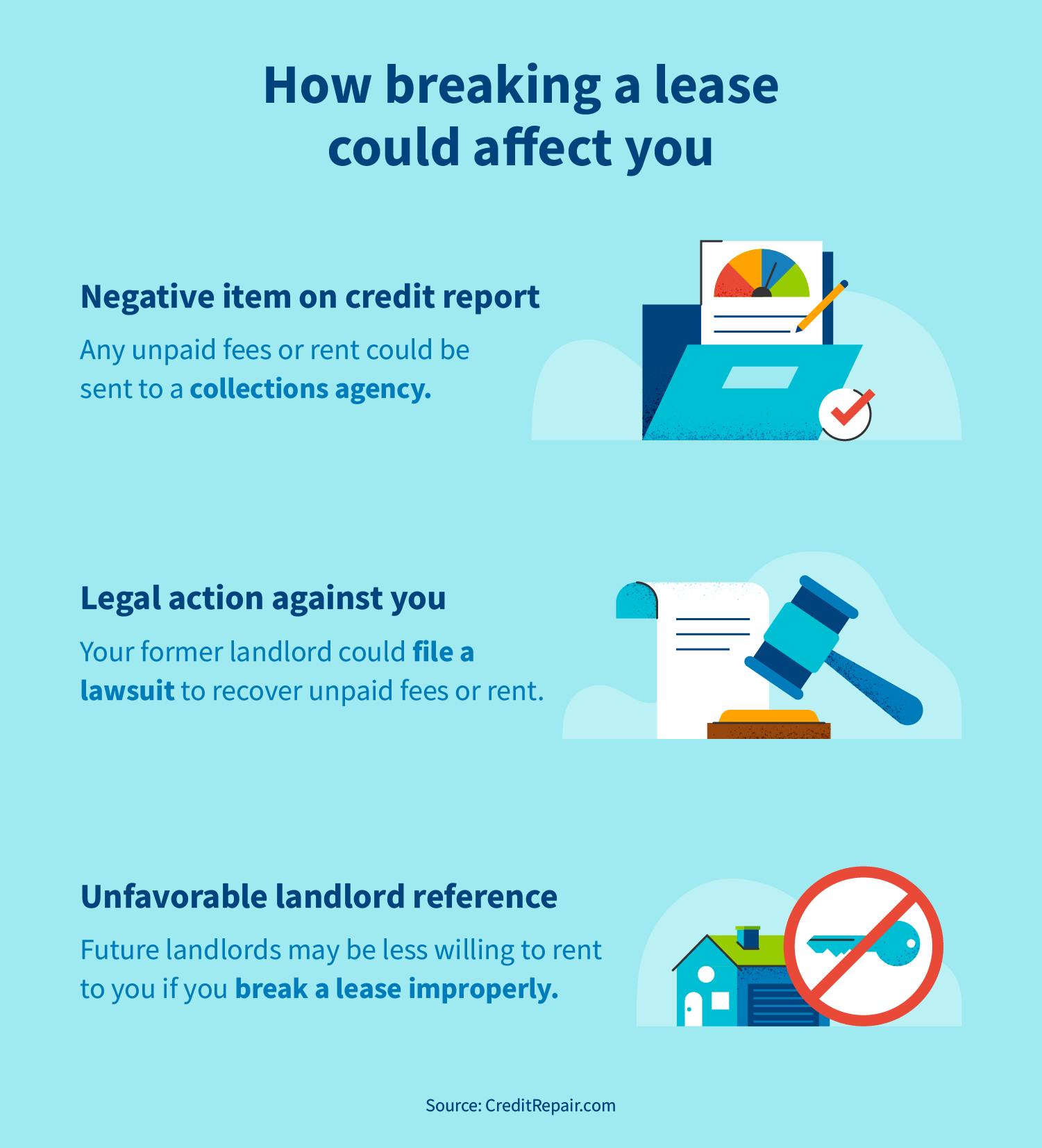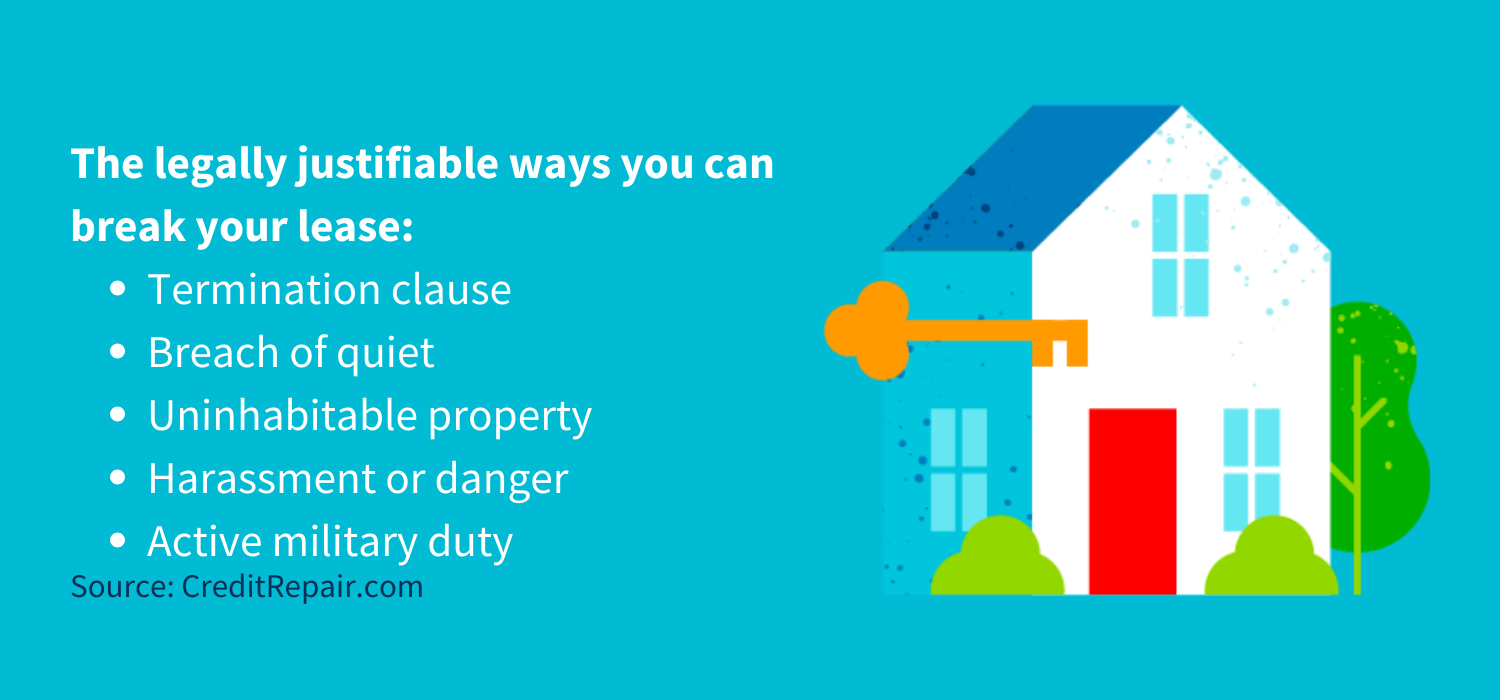
Disclosure regarding our editorial content standards.
Breaking a lease does not directly affect your credit. However, some of the consequences of breaking a lease could hurt your credit. For example, unpaid rent or fees could be sent to a collection agency, which will report the debt to the credit bureaus. Also, your former landlord could file a lawsuit to collect the money you owe, which may lead to a note in your public record, making it harder to apply for new credit.
You may need to break a lease for a variety of reasons, like moving in with a partner, changing jobs or finding yourself unable to afford your current living situation. It’s often possible to break a lease early, but you’ll want to be sure to make arrangements with your landlord. If you simply leave and stop paying your rent, you’ll likely face both financial and legal consequences.
Read on to learn more about how breaking a lease could affect your credit as well as how you may be able to break your lease without hurting your credit score.
How breaking a lease could affect your credit
Because landlords typically don’t report to the three credit bureaus—TransUnion®, Experian® and Equifax®—breaking a lease isn’t likely to show up directly on your credit report. However, breaking your lease often involves fees or rent payments, and failing to pay will probably hurt your credit.
Before breaking your lease, make sure to read your lease agreement and consult with your landlord to figure out the best approach for your situation.

If you don’t take care to break your lease properly and pay what you owe, you could face any of the following consequences:
- Any unpaid fees or rent payments could be sent to collections. Once a collection agency reports your unpaid debt, you’ll receive a negative mark on your credit report that is likely to decrease your score.
- Your landlord could sue you for the money you owe. Your former landlord may sue for your unpaid rent or fees. If you’re found responsible and can’t pay, the court may allow the landlord to garnish your wages—that means they’ll have access to a portion of your paycheck before you do. A successful lawsuit may also lead to a note in your public record, making it harder to apply for new credit.
- Future landlords may be less willing to rent to you. Whether or not your credit is directly affected, future landlords may contact your previous landlord and be less willing to rent to you if you broke a lease without fulfilling your financial responsibility. Having a good rental history is an important part of being a responsible tenant and finding future housing.
Overall, it’s important to make sure to pay what you owe when breaking your lease—otherwise your credit score may suffer or you could face serious legal consequences.
That said, it’s definitely possible to break a lease without hurting your credit. Read on for a few suggestions for what to do if you need to leave your living situation before your lease is up.
How to break your lease without hurting your credit
The good news is that there are ways you can break your lease without hurting your credit—or do so with minimal damage.
If you’re looking to break your lease, keep the following in mind.
Look closely at your lease agreement
Before making any decisions about breaking your lease, make sure to read your lease agreement closely. Your contract may include specific information about how to break your lease—including details like how much you’ll need to pay if you choose to do so.
In many cases, you’ll be responsible for paying some or all of your remaining rent, and in other cases you’ll have to pay a penalty or forfeit your security deposit if you break your lease.
Your lease agreement may not outline the specific steps required to break your lease. In any case, the best next step is to discuss the situation with your landlord.
Discuss with your landlord
Don’t hesitate to let the landlord know that you’re considering breaking your lease. Many landlords will be willing to work with you to find a solution that works for everyone involved.
Some states require landlords to make a good faith effort to find a replacement tenant for you, in which case you may only owe rent for the time that the housing was vacant.
Make sure you clearly explain your situation and understand the paperwork and cost that will be involved in breaking your lease. If you make an agreement with the landlord, make sure to get it in writing and signed by both parties—a spoken agreement isn’t sufficient for this situation.
Find a new tenant or a sublet
Your landlord may be more willing to accept you breaking the lease if you provide a suitable replacement. While some landlords will seek to find a replacement on their own, if you know someone who would be a good fit, that could expedite the process of breaking your lease.
Depending on your contract, you may be allowed to sublet your apartment for the remainder of your lease—that means you’ll find someone to live in the unit and they’ll pay you rent each month. Keep in mind that your lease may not allow subletting, and you’re still ultimately on the hook for the rent.
Make sure to pay any rent or fees you owe
Once you’ve made an agreement with the landlord, you’ll want to make sure to pay any rent or fees you owe. It may be possible to arrange a payment plan, but make sure you have the terms in writing as discussed above.
Failure to pay what you owe for the lease you signed is likely to lead to a variety of financial and legal consequences. If you’re struggling financially, try to work with the landlord to find a solution that works for everyone involved.
Keep good records
Keep records of everything regarding your lease break, including receipts for related goods and services, copies of written communications with the landlord and anything else related to the lease termination. It’s important to be proactive, even if your landlord seems agreeable and willing to compromise with your lease termination.
These records may protect you if:
- The landlord tries to take you to court and claims you didn’t pay.
- The landlord reports false or inaccurate negative information to the credit bureaus and you must file a dispute.
- You receive a collections notice even though you’ve paid everything you owe.
The legally justifiable ways you can break your lease

There are a handful of situations that allow you to legally break your lease:
Termination clause
Review your lease agreement to identify if there’s a termination clause. This clause allows renters to break their lease early under specific conditions.
Breach of quiet
Renters have the right to a reasonably quiet and safe home. When your landlord or other tenants infringe on this right, it’s known as a breach of quiet and may be legal grounds for a lease termination.
Examples of a breach of quiet include your landlord showing up to visit unannounced or other tenants having screaming arguments at 4 a.m. every weekend. Many courts will side with a renter in a breach of quiet violation, even if this clause wasn’t in their rental agreement.
Uninhabitable property
Landlords are required to keep the rental property in a livable condition. If landlords don’t attend to situations such as vermin infestations, broken plumbing or leaking roofs, the renter may have legal cause to break the lease.
Harassment or danger
Some states allow individuals who are in danger—such as victims of stalking, domestic abuse or sexual assault—to end their lease early. The landlord may ask for proof of the harassment or danger before granting the termination. Proof could include either an order of protection or a report from the police, a domestic violence advocacy group or a health care professional.
Active military duty
Individuals called to active military duty have the legal right to terminate their rental lease early. However, this applies only if you signed the lease before you found out about the active duty assignment. If you sign a lease after the assignment, you can break the lease only if you’re ordered to deploy for 90 days or longer or are being asked to permanently move to a new station.
No matter what, after you break a lease, you’ll want to check your credit report and credit score to see the effects it had.
Check your credit after breaking a lease
After you’ve broken your lease and paid any associated costs, you’ll want to get a copy of your credit report from each of the three bureaus. Read the reports closely to make sure you don’t have any new or incorrect debts listed that might affect your credit. If you want to get your broken lease off your credit history, you’ll need to make sure that you pay off any collection debts associated with unpaid rent or fees.
You’ll also want to check your credit score to make sure you’re still trending toward meeting your financial goals. A higher credit score can help you get better interest rates on loans or credit cards.
If your score has taken a hit and your credit report contains inaccurate information—either related to breaking your lease or anything else—you’ll want to start a dispute. This is an important part of repairing your credit and ensuring your credit history only contains factual information.
Even though breaking a lease does not directly affect your credit, it’s best to double-check and make sure everything is rolling along nicely after settling things with your landlord.
Note: The information provided on CreditRepair.com does not, and is not intended to, act as legal, financial or credit advice; instead, it is for general informational purposes only.
Questions about credit repair?
Chat with an expert: 1-800-255-0263






